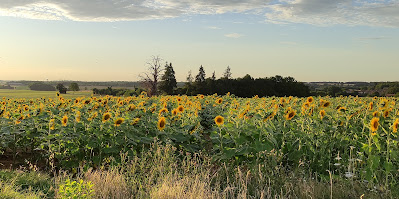Sunflowers are everywhere in this part of France, a
wonderful show of bright yellow that heralds the long summer days and has
beekeepers rubbing their hands in anticipation of a bumper harvest of the
well-known granular honey. Without wishing to dampen the mood too much,
sunflowers are also a vivid reminder of the current situation in Ukraine as
they are the country’s national flower. The sunflower, soniashnyk in Ukrainian, is also the symbol of the resistance
movement against the invasion by Russia.
The plants were first brought to Europe from the Americas by the Spanish in the 17th century, and started to be grown in Ukraine in the 18th century. Extremely successfully too; if you look at the figures then you’ll understand just how important sunflowers are to the country’s economy. Ukraine is the largest producer of sunflower seeds (17.5m tonnes in 2020/21!) and the biggest exporter of sunflower oil. It should then come as no surprise to find that there are more beekeepers per head of population in Ukraine than anywhere else in the world.
Sunflowers are good for bees and beekeepers because 26-50kg of honey can be produced from one hectare of the plants, making it one of the few crops worth growing for honey production. The sugars in nectar from sunflowers cause it to ‘set’ relatively quickly so it is rarely seen in liquid form; not the best thing if you have an Australian flow hive – granular honey doesn’t tend to ‘flow’ that well. Known as ‘hyper-accumulators’, sunflowers are capable of extracting toxins from soil which is why they were planted around the sites of the Chernobyl and Fukushima disasters, in an attempt to ‘clean up’ radioactive elements in the land.
Amongst all the other difficulties being faced by the Ukrainian people, the war means that farmers are struggling to obtain key items such as seeds, and fuel for farm machinery. Labour shortages are being experienced as people flee and so crops are being sown later in the year than normal. All of this affects honey bees as their forage is no longer available, and beekeepers (if they remain in situ) are unable to care for their colonies. You may be thinking “There are more important things to worry about than the plight of Ukrainian bees” and yes, there are lots of concerns to consider these days, but such a drastic reduction in pollination is going to have ramifications down the years.
This year let’s all plant some sunflowers as a way of expressing our solidarity with the people of Ukraine, of cleaning our soil, feeding our bees and other insects, and brightening our world. To find out more about honey bees and their importance in our lives, please visit our website www.13bees.co.uk or call us on 05 45 71 22 90 to book a place on a taster session or beekeeping course.
*With thanks to Stephen Fleming, Beecraft, June 2022, for the information on Ukraine


No comments:
Post a Comment